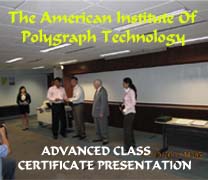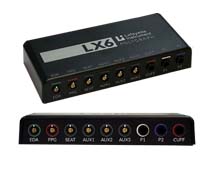

In 1972, representatives of the Southeastern Michigan Association of Chiefs of Police asked Mr Lynn Marcy, a graduate of, and former instructor at the Keeler Polygraph Institute, to develop an innovative basic polygraph training programme. The first training class was held at the Royal Oak Police Department during the Spring of 1973. Since then, the American Institute of Polygraph Technology and Applied Psychophysiology with Mr Marcy as its Director had provided American Polygraph Association (APA) accredited polygraph examiner basic, advanced and specialised training courses to law enforcement and security and intelligence agencies in the US as well as outside of the US, including Canada, Mexico, Singapore, Brunei, Indonesia and Malaysia.
In 1977, Ret. Supt Koa Fung Chew, the first polygraph examiner in Singapore, was trained by the American Institute of Polygraph Technology. (See profile) Over the next few decades, The American Institute of Polygraph Technology had trained hundreds of government polygraph examiners from different investigative agencies in various countries. After his retirement in 2001, Ret. Koa joined the American Institute as Assistant Director and Primary Instuctor. The American Intitute of Polygraph ceased its operation after Mr Marcy passed away in 2022.
In Oct 2023, Polygraph Investigative Services is in collaboration with the Gazit International Polygraph School of Israel to conduct on-site APA accredited Polygraph Training in Singapore and the Asia Pacific Region. Mr Mordechai Gazit, the founder of the Gazit International Polygraph School is an old friend of Ret. Supt Koa after they first met at an APA Seminar in Nasville, USA in 2009. Gazit International Polygraph School is the only institution in Israel and one of a few worldwide recognised by the APA. It trains tens of polygraph experts, private and government-employed, worldwide.
Mr Gazit has over 40 years of experience in the polygraph field in both government and private. Since the 1980s, has been testifying as an expert witness in Israeli courts. He is a member of the APA and the British and European Polygraph Association (BEPA). Mr Gazit has trained many polygraph examiners in Africa, Asia, Europe and South America
| Duration | Module |
|---|---|
| 8 hours | History of Polygraph Research: Explore the scientific foundation of polygraph testing by delving into the historical development of psychological and physiological research related to deception detection. |
| 20 hours | Polygraph Apparatus and Operation: Gain detailed knowledge of the polygraph instrument, including its components, functionalities, and operational procedures. This module covers calibration methods, data recording techniques, and proper apparatus operation. |
| 60 hours | Questioning Skills and Interrogation Techniques: Master the art of crafting effective and informative questions for successful polygraph examinations. This extensive module focuses on various questioning styles, interrogation methods, semantic emphasis, and practical exercises to hone your skill in phrasing questions and conducting interviews. |
| 60 hours | Polygraph Techniques for Diverse Scenarios: Develop the ability to adapt your approach to different situations and subjects. This module explores various polygraph techniques like control questions, peak tension, and the R-I technique, emphasizing their appropriate application based on the context, respondent, and specific case details. |
| 50 hours | Chart Analysis and Interpretation: Learn to interpret the physiological data recorded during a polygraph examination. This module equips trainees with the skills to analyze charts using established procedures like the global and numerical scoring methods to determine truthfulness. |
| 14 hours | Pre-test Interview and Preparation: Understand the crucial role of pre-test procedures. This module explores the function of the pre-test interview and guides the trainee through the development of effective interview strategies for both pre- and post-test stages. |
| 6 hours | Legal and Ethical Implications: Gain comprehensive knowledge of the legal and ethical considerations surrounding polygraph examinations. This module covers the legal obligations, professional responsibilities, potential dilemmas, and ethical solutions relevant to polygraph examiners. |
| 40 hours | Examiner Skill Development: Strengthen your practical skills through hands-on training sessions led by experienced instructors. This module provides opportunities to refine your proficiency in polygraph examination management through practical exercises and scenario-based training. |
| 8 hours | Polygraph in the Legal System: Explore the legal standing of polygraph examinations in court proceedings. This module delves into the circumstances under which polygraph results are admissible, the role of the examiner as an expert witness, ongoing regulatory debates, and the potential benefits and drawbacks of legal regulation. |
| 44 hours | Psychology and Physiology for Polygraph Examiners: Develop a foundational understanding of the psychological and physiological principles underlying polygraph testing. This module introduces key concepts from these domains and explores their connection to the science of psychophysiology in the context of law enforcement and lie detection. |
| 4 hours | Countering Countermeasures: Discover strategies to address attempts to manipulate or undermine the integrity of polygraph examinations. This module explores common countermeasures, methods for identifying such attempts, and techniques to effectively address them. |
| 8 hours | Polygraph in Candidate Screening: Learn how to utilise the polygraph as a tool for candidate assessment during pre-employment screening. This module covers specific techniques for screening job applicants through polygraph examinations, including interrogation methods and data analysis techniques. |
| 18 hours | Computerised Polygraph Examinations: Explore the use of computerised polygraph technology. This module introduces the functioning of computerised polygraphs, explains the computerised scoring system, and provides practical training in operating and analyzing data from these devices. |
| 30 hours | Advanced Seminar with Instructor: Engage in a direct and interactive session with the course instructor to delve deeper into specific aspects of the curriculum and address any remaining questions or areas of interest. |
| 20 hours | Assessments: Regularly evaluate your understanding and progress throughout the course. This module includes weekly quizzes, a final exam, and an oral and practical examination to assess your comprehensive knowledge and competency in conducting polygraph examinations. |
Footnote: The duration of each module is an estimate and may vary slightly based on the
specific curriculum design and instructor discretion. |
|
Singapore Contact:
Mr Koa Fung Chew
151 Chin Swee Road #03-33,
Manhattan House,
Singapore 169876
Email: kfc@polygraphis.com
PHONE: +65 6737 9117



